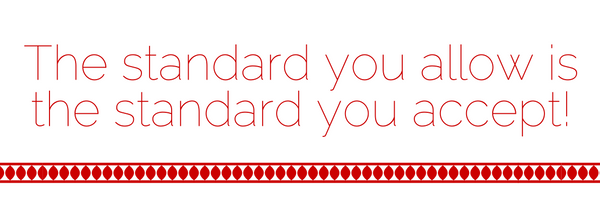What are you accepting? Are you even aware?
We often think it's only our actions that create our environment - but inaction can have as significant an impact for all of us. I've recently been reminded that allowing is accepting - and I thought I should discuss it with you too.Earlier this week I facilitated training on Difficult Conversations - trying to help managers with those conversations none of us ever want to have. It might surprise you to know that I shied away from training any 'soft' skills for a while; given all of the personal development stuff I talk about here, and my obvious passion for the topic. But I didn't feel comfortable facilitating courses on the topic, probably because many of the assertiveness or difficult conversations skills are not natural for me. As anyone I managed in the early days would attest (a probably a few later as well), these are very much learned skills in my world. That shouldn't be surprising since I refer to myself as a recovering people pleaser, but I was also a shocking perfectionist.Anyway, there is a line in our course material, the sentiment of which I'm sure you've heard in many different ways before - the standard you allow is the standard you accept! In Australia, we had a previous Chief of Army who gave a fantastic speech that included a very similar line - you can see it here. I think we tend to forget this in our day-to-day lives - I know I've allowed standards and behaviours from people I should never have accepted. Since I had a long drive back from that training session, over three hours, it played a lot in my mind. So much so I thought I would share it with you. Because even in the training, after I say this to the room, we talk about the need to sometimes play it safe - to not make yourself a target for bullies if it's not for you to resolve an issue. But you can never stay quiet on the topic, you should still tell the person who is responsible for managing the individual displaying the poor standard or behaviour. Because to do nothing is to say "I'm willing to accept that".
I think we tend to forget this in our day-to-day lives - I know I've allowed standards and behaviours from people I should never have accepted. Since I had a long drive back from that training session, over three hours, it played a lot in my mind. So much so I thought I would share it with you. Because even in the training, after I say this to the room, we talk about the need to sometimes play it safe - to not make yourself a target for bullies if it's not for you to resolve an issue. But you can never stay quiet on the topic, you should still tell the person who is responsible for managing the individual displaying the poor standard or behaviour. Because to do nothing is to say "I'm willing to accept that".
We learn the hard way
I know I spent years allowing people to treat me, and the people around me, in unacceptable ways. I've had verbally and emotionally abusive partners; friends and family who didn't respect my boundaries; work colleagues who said and did unacceptable things, to me and others; and I've been in social situations where I've allowed things to occur without saying anything. And yes, I am not exempt from this myself - at times in my life I have said and done things I am ashamed of, that other people should not have accepted from me. Sometimes they didn't, and as much as that hurts I think it is always preferable to be called on your shit than people letting you get away with unacceptable behaviour.When I talk about my biggest regrets, my failed marriages are definitely up near the top, but let's set them aside for a moment. In my working life, my biggest regret was a failure to speak up at my farewell dinner from the RAAF - topics like this tend to bring it back to me. To this day, I regret not saying something when they gave me a chance to reply to the speech that was part lovely and part highly inappropriate - a speech given by my Group Captain, to a room full of officers and their partners. I regret not saying anything in the moment, and I regret not making a formal complaint about it after the fact. I let down every other female in that room, and every other female officer who had the misfortune of dealing with the men responsible after that point in time. I have given that thank you speech again, over a hundred times in my head, sometimes subtly letting them know how I felt, other times launching into a full tirade on their behaviour.Of course, the moment has long passed and I cannot go back to fix it. Although I did get a chance to redeem it slightly, when I went back into the base as a civilian and someone referred to the speech in a base briefing. It was a glib comment that many people in the room might have missed, and many others would not have even understood - but it didn't pass me by. I went straight to the Equity Officer to file a formal complaint, to make up for not having done it the first time around. It was only then that I learned the Group Captain involved had been "torn a new one" - that the Chief of Staff had not accepted the behaviour. My response "well no one ever apologised to me for it, and none of the other officers know it happened." You see, the damage was done publicly - by not saying anything at the time the standard was allowed. The only way to truly let people know it wasn't accepted was to publicly say so, and no one ever did.
And yet I still do it
I am far less polite these days, I don't tend to let things slide that often. Don't get me wrong, I still protect myself against bullies where I feel the need to, but I'm far more likely to call someone on their behaviour now than I ever was before. I think that all the work with the Golden Rule helped me do this better - you know "do unto others".Like I mentioned earlier, if my behaviour is unacceptable I want to know. I don't like to 'get away' with it, other people's boundaries and standards are important. I do reserve the right to not change that behaviour if I think it's acceptable, not everything that offends or upsets someone is unacceptable - but I need to make a logical and intentional choice in those cases, and I would try to reduce the impact I was having on them.But with all that I am still polite and diplomatic, a lot! There are still times I accept a standard by simply allowing it occur without comment - particularly on social media. Well I would get nothing done if I didn't let a lot of that crap pass me by - unfollowing someone is a passive form of protest. And sadly I think we have to accept some of it, because it is not possible to call everyone out on unacceptable comments and behaviour. You have to pick your battles, and only take on the ones that truly matter to you.However, you should never forget the saying - never forget that if you don't have the energy or inclination to deal with that comment, joke or action, you are tacitly agreeing it is an acceptable standard in your world. And if you are in a leadership position within an organisation, this is how your culture is built, just as much as you modelling the behaviour you expect. When you allow people to erode your standards, you can't act surprised when they continue to do just that - or when other people start doing the same.It's been a timely reminder for me - how about you? What are you accepting because you aren't willing to speak up about it? What standard are you setting by tacitly agreeing to other people's words and actions? Do you need to do something about it?

